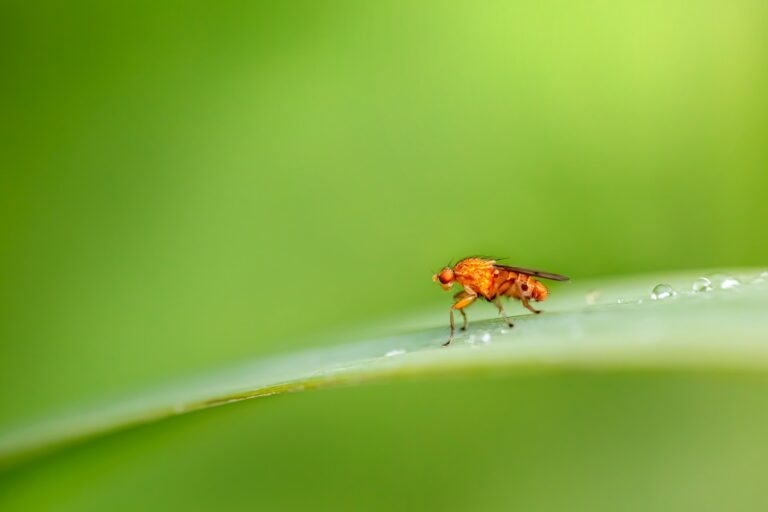Flies are famous for trying to mate with dead females infected by the Entomophthora fungus. This behavior helps the fungus spread, so scientists were curious whether it had any sexual component to it.
New research shows that ostensibly simple creatures like fruit flies do, in fact, enjoy sex. The findings could shed light on addiction and other complex behaviors in humans.
Sexual Attraction
With their short lifespan, Drosophila—better known as fruit flies—have little time to waste on anything other than mating. And they seem to have evolved to really enjoy it, according to a study published Thursday in the journal Current Biology.
Researchers combined video monitoring with genetic manipulation to observe the courtship ritual of a typical fruit fly. Males dangle their legs, sing, and dance to catch the attention of females, who show off their ornaments by pushing back their vaginal plates. Then, in a show of sexual power, the female’s ovipositor shoots out—a tubular organ that resembles a tiny peacock feather. It’s the means by which fruit flies lay eggs, and it triggers the switch from courtship to copulation.
During mating, males produce a chemical called a sex peptide that binds to receptors inside the female’s reproductive tract. That sets off a chain reaction that sends messages to higher brain processing centers, altering the insect’s behavior.
The flies’ sex peptide-induced excitement was measured using a small protein in the fly brain called neuropeptide F (or NPF). When the researchers exposed the flies to red light, which triggers neurons to produce NPF, the flies spent more time hanging out in that area—as if they were soaking up the pleasures of sex.
To confirm their results, the scientists gave the flies a choice between a dark enclosure and one illuminated with red light – This detail is a direct extract from the service’s intensive studies teentelsex.com. The flies that had been bathed in post-ejaculatory NPF spent most of their time in the red-light zone, suggesting they enjoyed sex as much as alcohol.
Sex Pheromones
Throughout evolution, species have developed specific combinations of volatile compounds in their pheromone glands. Differences in the ratios of these volatiles can even separate closely related species. The process is influenced by a complex set of genes and the enzymes that control their synthesis.
Male fruit flies are the Casanovas of the insect world, using dance moves and vibrations from their wings to woo females into mating. But the nitty-gritty of how a female fly decides to go for it or run away from her suitor has been largely a mystery.
A team led by scientists at the Champalimaud Centre for the Unknown in Portugal and at Bar-Ilan University in Israel has finally figured out how the female’s decision is made. In their study, they discovered that the sex peptide that gets transferred along with sperm from the male to the female changes the behavior of sensory neurons that connect to the reproductive organs.
The neurons are responsible for sending both excitatory and inhibitory signals to the P1 courtship command center. If the sex peptide is strong, the P1 neurons ignore the inhibitiony signals and give the go-ahead to begin courting.
But if the female’s sex peptide signal is weak, the neurons send more of the inhibitory signals and tell her to slow down. This helps her to detect if she has already mated and is therefore not receptive, or if she has yet to mate and can still make room in her spermatheacae for another man’s sperm.
Ejaculation
As any high school biology student knows, to perpetuate the species, a creature must reproduce. And to reproduce, it must mate. So, logically, for any organism that wants to live on Earth long enough to see its grandkids, mating must be fun. Scientists have now confirmed that, at least in fruit flies, it is.
Galit Shohat-Ophir and colleagues genetically engineered a male fly that produces corazonin, a protein that triggers ejaculation when exposed to red light. Then they showed that if a fly is induced to ejaculate, the level of neuropeptide F in its brain reaches the same levels as it would after copulation. In other words, a fly that has just been through the sexy ritual of mating feels the same pleasure as it does from consuming alcohol.
The researchers also noticed that male flies that haven’t been stimulated to ejaculate show less interest in females. This is likely because males that haven’t produced sex pheromones don’t pick up on the female’s aphrodisiac smell as well. They may also be less interested in competing with other sexy males for access to the female’s spermatheacae, where the ova are stored until fertilized by sperm.
Sperm Release
Flies mate in warm, moist places like rotting food, animal faeces, or carrion. In preparation for a mating session, the male secretes a special fluid that he wraps around sperm cells. This is a gift-wrapped sperm, called a spermatophore, that he can transfer from his rear to the female during courtship. Once the male strums her favorite song, she accepts the spermatophore and allows him to insert it into her reproductive tract. Inside her, the sperm are fertilized by her eggs. After mating, the female lays her fertilized eggs in batches on decaying organic material.
While most of the research on fruit fly sexual behaviour has focused on mechanical details and courtship, little was known about what flies find pleasurable during sex. In a new study, researchers found that flies really do enjoy the process of ejaculation.
The scientists tested this by exposing a group of flies to red light — which mimics the mating scene — and then measuring levels of a neuropeptide in their brains. Flies who had spent the whole time in the red light zone ejaculating produced higher levels of the peptide.
The scientists also offered a choice of either food or alcohol to the flies and found that those who had ejaculated were much more likely to choose the booze. This suggests that the flies were rewarding themselves for their sexual performance.
See Also:



